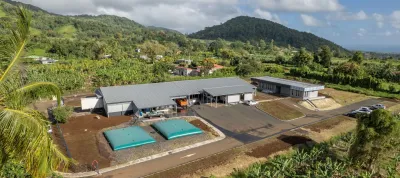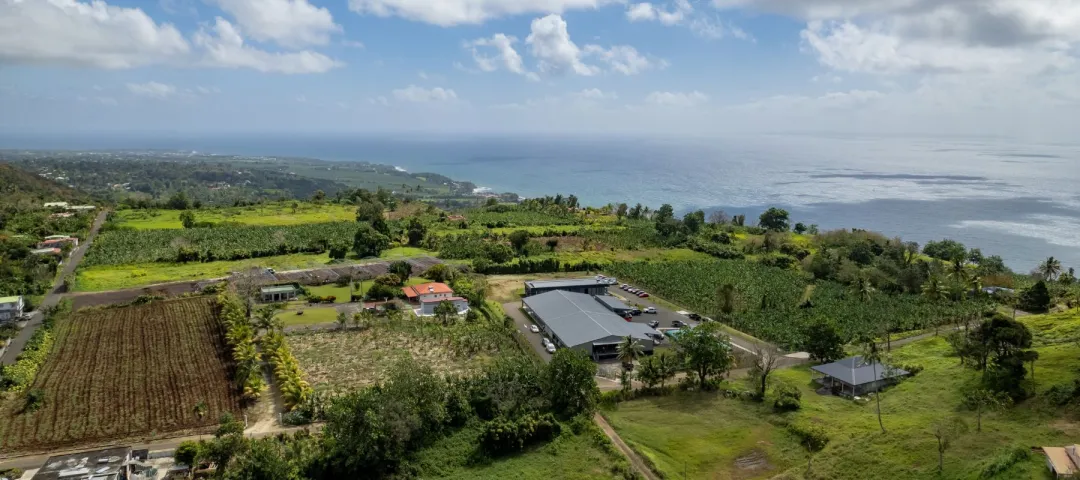General information
RDP Priority
- P2. Competitiveness
RDP Focus Area
- 2A: Farm’s performance, restructuring & modernisation
RDP Measure
- M04: Investments in physical assets
Beneficiary type
- Producer group / cooperative / farmer’s association
Summary
When banana farmers work together on initiatives, economies of scale can be enhanced. This is particularly crucial in the banana industry, where price volatility can significantly impact individual livelihoods. Collective processing allows shared access to equipment and technology that might otherwise be unaffordable for smallholder farmers.
SICA Les Producteurs de Guadeloupe (SICA LPG) is a cooperative that brings together many banana producers, most of which produce less than 500 tonnes annually and are considered small and medium-sized businesses.
The smallest and most vulnerable of these producers used packaging facilities that did not conform to regulatory requirements. Using CAP funds, SICA LPG constructed a collective banana packaging facility to centralise this activity, which was previously carried out individually in sheds on each farm.
Results
- The improved quality and yield per hectare (ha) increased the small farms’ productivity and turnover.
- To date, the station has enabled the hiring of five women and nine men.
- The systems of the new packaging station allow for improved waste management and water savings.

Promoter
SICA Les Producteurs de Guadeloupe (SICA LPG)
Funding
Total budget 3 746 080 (EUR)
EAFRD: 2 040 000 (EUR)
National/Regional: 560 000 (EUR)
Private/own: 1 146 080 (EUR)
Ressourcen
Documents
Context
When banana farmers work together on initiatives, economies of scale can be enhanced. By pooling resources and efforts, farmers can achieve lower production costs per unit. This is particularly crucial in the banana industry, where price volatility can significantly impact individual livelihoods. Collective processing allows shared access to equipment and technology that might otherwise be unaffordable for smallholder farmers.
The French commune of Capesterre-Belle-Eau in Guadeloupe includes 60% of the island's banana production and 65% of its producers. La Plaine is an area within the commune known for its beauty and agricultural importance. La Plaine is an important production area with many small banana farms (less than 5 ha on average).
SICA Les Producteurs de Guadeloupe (SICA LPG) is a cooperative that brings together 169 banana producers, including 134 members who produce less than 500 tonnes annually and are considered small and medium-sized businesses. These small and medium producers tend to use packaging facilities that do not conform with regulatory (labour code), technical (quality specifications, traceability and certification), environmental (harvest effluent management) and ergonomic (improvement of working conditions and reduction of arduousness) requirements. The costs of upgrading and/or modernising these packaging facilities could not be covered by the most vulnerable farms. Hence, there was a decline in the number of smaller businesses, making it difficult for new producers to enter the sector.
SICA LPG decided to support its members and launch the construction of a collective banana packaging facility in the Plaine area in Capesterre-Belle-Eau. This would allow them to centralise an activity previously carried out individually in sheds on each farm.
Objectives
The aims of this investment project were to improve the competitiveness of small producers by establishing a modern packaging station, allowing them to comply with technical, regulatory, environmental and ergonomic requirements.
Activities
Project activities included:
Designing the collective packaging station project with a maximum annual capacity of 4 500 tonnes. This would facilitate the production of 22 members, which corresponds to more than 10% of the cooperative and 95 ha of banana plantation. This was around 6% of the total banana-cultivated area on the island in 2023.
Constructing the station supports various processes that maintain the quality of the bananas from the moment they arrive at the collection station to their transport out to the intended market.
Main results
- The improved quality and yield per hectare increased the small farms' productivity and turnover.
- To date, the station has provided jobs for five women and nine men. All employees (men and women) are multi-skilled workers trained for the same positions. A complete training programme took place to handle the different positions and processes, including unpacking, cutting, packaging and palletising bananas.
- The new packaging station has environmental benefits as it facilitates the management of harvest effluents with a Héliosec device. This device is used to manage and treat wastewater generated during the post-harvest process. It is designed to evaporate water from pesticide-laden wastewater, leaving only solid residues that can be safely disposed of. This helps prevent the contamination of soil and water sources due to intensive banana farming.
- The new station saves water thanks to the installation of flexible tanks and a wastewater recycling system.
- It has also improved working conditions through automation and reduction of arduous work.
- Increased traceability has now enabled the producers' data (including bunches delivered and packages prepared) to be tracked and documented.
Key lessons
- Investments in modern and clean production facilities are important not only for increasing productivity and competitiveness but also for improving the sector's public image.
- Enhanced traceability allows farmers to monitor the entire supply chain, from cultivation to consumer delivery. This transparency assures consumers of the safety and quality of the bananas they purchase and reinforces brand integrity in a competitive market. By establishing robust traceability systems, EU banana farmers can respond swiftly to food safety issues or recalls, thereby minimising potential economic losses and maintaining consumer trust.
- Treatment of pesticide-laden wastewater is essential for environmental sustainability. By adopting advanced wastewater management practices, farmers can mitigate the negative impacts of agricultural runoff on local ecosystems. This proactive approach contributes to preserving biodiversity and protecting water resources, vital in maintaining healthy agricultural landscapes. Furthermore, compliance with stringent EU regulations regarding pesticide use and environmental protection enhances farmers' reputational standing within both domestic and international markets.
